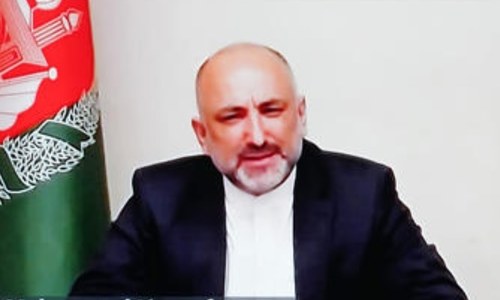Chairman of Afghanistan's High Council for National Reconciliation Dr Abdullah Abdullah on Monday thanked the Pakistani leadership for its efforts to take the Afghan peace process to its logical conclusion, Radio Pakistan reported.
Abdullah lauded Pakistan's role in the peace process during a meeting with Foreign Minister Shah Mahmood Qureshi in Islamabad.
Qureshi said Pakistan backed a peaceful and durable political solution of Afghanistan's conflict through an Afghan-led and Afghan-owned peace process.
He said Pakistan had been playing the role of a facilitator in the process "as a shared responsibility", according to the report.
The foreign minister said the US-Taliban agreement and later the intra-Afghan dialogue held in Doha had raised the prospects of longlasting peace in Afghanistan. He said the Afghan leadership should seize this "historic opportunity" and undertake serious efforts to take the peace process to its conclusion.
Qureshi said an eye should also be kept on "the spoilers who do not want peace and stability in the region", adding that the international community will have to come forward for the reconstruction and economic stability of Afghanistan.
"Pakistan desires dignified return of millions of Afghan refugees to their homeland," the minister said.
He said Pakistan respects the territorial integrity and sovereignty of Afghanistan and wants to develop strong economic cooperation with the neighbouring country.
Addressing a press conference after the meeting, Qureshi said Pakistan had always maintained that there was no military solution to the Afghan conflict, which could be ended only through a political settlement.
"We have fulfilled our responsibility, now you have to go forward and play your part and I hope that you will be successful," he told the Afghan leadership. "Whatever we can do to facilitate we have done and will do it."
Earlier in the day, Abdullah had arrived in Islamabad on a three-day official visit. This is the Afghan leader's first visit to Pakistan in his capacity as chairman of the High Council for National Reconciliation.
He is accompanied by a high-level delegation comprising prominent members of the council.
According to the spokesperson for the Ministry of Foreign Affairs, Abdullah will also meet Prime Minister Imran Khan, President Dr Arif Alvi, Senate Chairman Sadiq Sanjrani and National Assembly Speaker Asad Qaiser during the trip.
In a tweet shortly after arriving, Abdullah said that he will meet the Pakistani leadership and "exchange views on Afghanistan peace and bilateral relations".
Later, he visited the Foreign Office where he was welcomed by FM Qureshi. The visiting dignitary also planted a sapling at the premises.
On Sunday, the Afghan leader had stated that the visit would provide a unique opportunity for the two sides to exchange views on Afghanistan peace talks in Doha and bilateral relations.
"I hope this visit will open a new chapter of mutual cooperation at all levels, especially on achieving a lasting and dignified peace in Afghanistan," he had said on Twitter.
During his visit, Abdullah will also speak at the Institute of Strategic Studies Islamabad and will also meet journalists.
The visit will provide an opportunity for wide-ranging exchange of views on the Afghan peace process and strengthening of Pakistan-Afghanistan bilateral relations and people-to-people interaction.
Hasty withdrawal from Afghanistan would be unwise: PM Imran
In an op-ed published in The Washington Post on Saturday, Prime Minister Imran Khan warned that a hasty international withdrawal from Afghanistan would be "unwise" and cautioned against setting unrealistic timelines.
The premier said that the path leading to the talks between the Afghan leadership and the Taliban was not easy but "we were able to press on thanks to the courage and flexibility that were on display from all sides".
He pointed out that the United States and its allies had facilitated the prisoner exchange — which the Taliban had linked to resumption of the peace talks — while both the Afghan government and the Taliban had "responded to the Afghan people’s yearning for peace".
The premier said that the intra-Afghan negotiations were "likely to be even more difficult, requiring patience and compromise from all sides".
"Progress could be slow and painstaking; there may even be the occasional deadlock, as Afghans work together for their future. At such times, we would do well to remember that a bloodless deadlock on the negotiating table is infinitely better than a bloody stalemate on the battlefield," he wrote.
He added that all sides who were invested in the Afghan peace process should "resist the temptation for setting unrealistic timelines". He also warned of regional spoilers, who he said saw instability in Afghanistan as an advantage for their own political purposes.
The premier highlighted that it was important to start planning for what would happen in post-war Afghanistan. "How can the world help a post-war Afghanistan transition to sustainable peace? How do we create conditions that will enable the millions of Afghan refugees living in Pakistan, and other countries, to return to their homeland with dignity and honour?"
He assured that Pakistan would continue to support the Afghan peace process. "Like the United States, Pakistan does not want to see Afghanistan become a sanctuary for international terrorism ever again."
















































